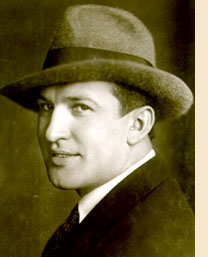
William Dieterle
1893 - 1972
"When Laughton acted that (whipping) scene (in Hunchback), enduring the terrible torture, he was not the poor crippled creature expecting compassion from the mob, but rather oppressed and enslaved mankind, suffering the most awful injustice."
Filmography (Director)
Ein Sommernachtstraum (1968) (TV)
Die Mongolenschlacht (1966) (TV)
Samba (1966) (TV) (as Wilhelm Dieterle)
The Confession (1964)
Antigone (1962/I) (TV)
Das Vergnügen, anständig zu sein (1962) (TV)
Gabriel Schillings Flucht (1962) (TV)
Die große Reise (1961) (TV)
Die Fastnachtsbeichte (1960)
Ich fand Julia Harrington (1960) (TV)
Die Herrin der Welt - Teil II (1960)
Die Herrin der Welt - Teil I (1960)
Il vendicatore (1959)
Omar Khayyam (1957)
"Screen Directors Playhouse" (1 episode, 1956)
- One Against Many (1956) TV episode
Magic Fire (1955)
Elephant Walk (1954)
Salome (1953)
The Turning Point (1952)
Boots Malone (1952)
Red Mountain (1951)
Peking Express (1951)
Dark City (1950)
September Affair (1950)
Vulcano (1950)
Paid in Full (1950)
Rope of Sand (1949)
The Accused (1949)
Portrait of Jennie (1948)
Duel in the Sun (1946) (uncredited)
The Searching Wind (1946)
This Love of Ours (1945)
Love Letters (1945)
I'll Be Seeing You (1944)
Kismet (1944)
Tennessee Johnson (1942)
Syncopation (1942)
All That Money Can Buy (1941)
... aka The Devil and Daniel Webster (International: English title) (USA: reissue title)
A Dispatch from Reuter's (1940)
Dr. Ehrlich's Magic Bullet (1940)
The Hunchback of Notre Dame (1939)
Juarez (1939)
Blockade (1938)
The Life of Emile Zola (1937)
Another Dawn (1937)
The Prince and the Pauper (1937)
The Great O'Malley (1937)
Satan Met a Lady (1936)
The White Angel (1936)
The Story of Louis Pasteur (1935)
Dr. Socrates (1935)
A Midsummer Night's Dream (1935)
The Secret Bride (1934)
The Firebird (1934)
Madame Du Barry (1934)
Dr. Monica (1934) (uncredited)
Fog Over Frisco (1934)
Fashions of 1934 (1934)
From Headquarters (1933)
Female (1933) (uncredited)
The Devil's in Love (1933)
Adorable (1933)
Grand Slam (1933)
Lawyer Man (1932)
Scarlet Dawn (1932)
6 Hours to Live (1932)
The Crash (1932)
Jewel Robbery (1932)
Man Wanted (1932)
Her Majesty, Love (1931)
The Last Flight (1931)
Die heilige Flamme (1931)
Eine Stunde Glück (1931)
Dämon des Meeres (1931) (uncredited)
Kismet (1931)
Der Tanz geht weiter (1930)
Ludwig der Zweite, König von Bayern (1930)
Die Maske fällt (1930)
Das Schweigen im Walde (1929)
Frühlingsrauschen (1929)
Ich lebe für Dich (1929)
Durchs Brandenburger Tor. Solang noch Untern Linden... (1929) (supervising)
Geschlecht in Fesseln - Die Sexualnot der Gefangenen (1928)
... aka Sex in Chains (USA: DVD title)
Die Heilige und ihr Narr (1928)
Das Geheimnis des Abbe X (1927)
Der Mensch am Wege (1923)
Web Resources:
Forum
The Devil and Daniel Webster (MoC)
The Last Flight
Silent Film on DVD
The Hunchback of Notre Dame (1939)
Edition Filmmuseum (re Ludwig der Zweite)
The Devil and Daniel Webster (CC)
Sites devoted to Dieterle and his work:
imdb
TSPDT
TCM on Dieterle
Dcairns on Dieterle
An appreciation by Mike Grost
mondo digital appreciation of Dieterle's classic films
..more to come.